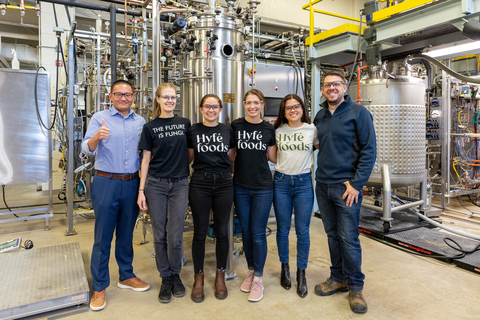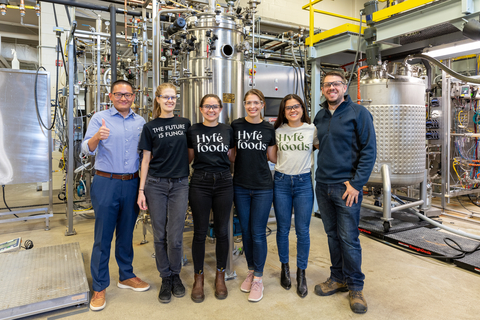CHICAGO--(BUSINESS WIRE)--Hyfé, a climate-tech company unlocking low-cost production of sustainable essential goods, today announced it has scaled production of its mycelium protein to 400L pilot bioreactors since its launch and pre-seed funding last May.
The company is three months ahead of schedule, having completed scale up in November with the support of Boston BioWorks and the University of Illinois Integrated Bioprocessing Research Lab.
Hyfé is transforming food manufacturing waste streams into fermentation feedstock. Biomanufacturing has the potential to create solutions to some of the most pressing challenges facing humanity. It can enable improvements in health, climate, and quality of life if rendered economically viable. Reducing cost of production is key to making sustainable bioproducts competitive against subsidized commodities. The feedstocks that power bioproduction represent a high impact opportunity since they account for up to 50% of fermentation operating expenses and are vulnerable to supply chain disruptions.
Hyfé’s patent-pending technology captures nutrients that are washed away in food manufacturing process water and converts them into fermentation feedstocks that are dramatically cheaper and climate positive. “Our mission is to use our flexible fermentation platform to produce cost-competitive essential goods for multiple industries, repurposing millions of pounds of wasted nutrients and keeping tons of emissions out of the atmosphere every year,” said co-founder and CEO Michelle Ruiz.
The company has chosen mycelium protein as its first product category to showcase the technology’s ability to make high quality, consistent products from variable inputs. The mycelium protein has a neutral-flavor profile, is packed with fiber and contains no allergens. The company plans to use the protein’s versatile functionality profile to help consumer packaged goods companies create healthier and sustainable staple foods to address rising consumer demands for better-for-you, better-for-the-planet options.
Founded in 2021 by former LanzaTech and ExxonMobil engineers, Hyfé is supported by Boston Bioworks and the University of Illinois Bioprocessing Research Laboratory. The Engine, the venture firm spun out of MIT that invests in early-stage Tough Tech companies, led the company’s recent, oversubscribed investment round.
Consumer packaged goods and ingredient manufacturers that use protein in their products may contact info@hyfefoods.com to learn more about the company.
About Hyfé
Hyfé is a Chicago based climate-tech company unlocking low-cost production of sustainable essential goods by transforming food manufacturing waste streams into fermentation feedstock.
Wastewater accounts for 1.5% of global greenhouse gas emissions, and food manufacturing is the third largest contributor. Hyfé’s patent-pending technology upgrades nutrients that are washed away in trillions of gallons of water from the food supply chain every year and uses them to drive down the cost of fermentation. To follow their journey, follow Hyfé and founders Michelle Ruiz and Andrea Schoen on LinkedIn.
About Boston BioWorks
Boston Bioworks provides advanced fermentation process development and scale-up services to bio-ingredient producers. The company is a first-of-its-kind platform for fermentation-based companies to scale products, enabling clients producing ingredients from precision fermentation (such as meat and dairy proteins, fats, flavorings, and similar ingredients) or from biomass fermentation (such as mycelium) to seamlessly bridge the gap between strain engineering and industrial-scale production.
About IBRL
The Integrated Bioprocessing Research Lab (IBRL) is a pilot-scale facility at the University of Illinois, Urbana-Champaign. The staff of 50+ includes experience in both industry and academia as well as a robust student internship program. In the four years IBRL has been operational, it has provided world-class pilot plant services to the food and bioprocessing industries by working with 70 different companies including several who have successfully launched products to market.
IBRL’s clients represent growing industries such as alternative protein for food and cosmetics, high-value compounds such as bio-based insecticides and textiles, sweetener molecules, fuels, and others. IBRL’s core competencies include fermentation-based technologies, downstream processing, and commodity separations. The demand for pilot-scale support of these technologies has been enormous in the last several years and only seems to be increasing. IBRL staff hopes to continue to programmatically expand and have an even larger impact on the bio-manufacturing economy moving forward.




